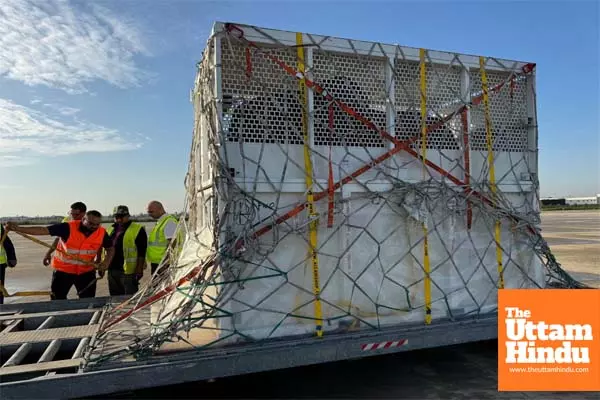
Vantara to Welcome Three African Elephants from Tunisia to Experience a New Life of Care and Compassion
With limited resources to provide for the elephants’ needs, a private Tunisian zoo sought Vantara's assistance in offering them a nurturing home.

Jamnagar (The Uttam Hindu): Three African forest elephants—two females and one male, aged 28 to 29 years—are soon to find a compassionate new home at Vantara, one of the world’s most esteemed wildlife rescue centers located in Jamnagar, India. Founded by Anant Mukesh Ambani, Vantara was approached by a private zoo in Tunisia that struggled to meet the elephants’ complex dietary, housing, and veterinary needs due to financial constraints. More than two decades ago, at just four years old, Achtaum, Kani, and Mina were transferred from Burkina Faso to Friguia Park, a zoo in Tunisia, where they have remained as a spectacle for visitors for nearly 23 years. All regulatory and legal compliance with national and international law, including the requirements of the Convention on International Trade in Endangered Species of Wild Fauna and Flora (CITES), has been completed. The elephants will be transported to India via a chartered cargo aircraft.
Despite being a focal attraction at Friguia Park, financial constraints began to impact the zoo, leading to the decision to retire three African forest elephants and offset costs. The zoo recognized that, after years of captivity and a heavy reliance on human care, a return to the wild was neither feasible nor desirable. Consequently, they sought a facility that could offer the elephants the best chance for a peaceful and fulfilling retirement—one that would meet all their specialized health needs and provide the compassionate care they deserve. Ultimately, Vantara was identified as the ideal destination.
A recent health assessment by Vantara’s veterinary experts revealed that the elephants are facing various healthcare challenges. Untreated skin conditions had caused hair loss and matted skin, underscoring the need for consistent medical attention. Achtaum has a split tusk and a molar tooth infection requiring careful medical and surgical management, while Kani shows signs of cracked nails, likely due to prolonged exposure to hard flooring. Currently, the elephants live in a poorly ventilated concrete house and a paddock that lacks the essential enrichment necessary for their mental and physical well-being. Their diet has primarily consisted of dry hay, with limited access to clean water.
While African forest elephants (Loxodonta cyclotis) are native to the dense tropical forests of Central and West Africa, no wild populations of this species exist in Tunisia. In their natural habitats, these elephants thrive in vast forest landscapes, enjoying the freedom to forage on diverse foliage and access mud wallows that benefit their skin health. Vantara has recreated these comforts through expansive, enriched enclosures featuring native flora, mud pools, and thoughtfully designed food enrichments that encourage natural foraging behaviors. Their new home at Vantara will provide Achtaum, Kani, and Mina with an environment that closely resembles their wild habitat while offering specialized care to support their physical, psychological, and social well-being—a renewed opportunity for them to live a life filled with compassion.

